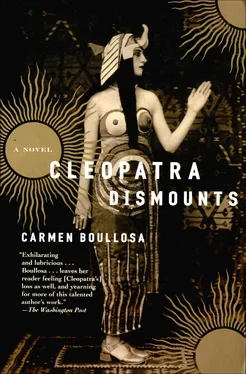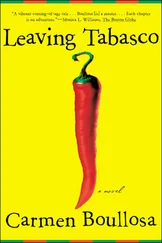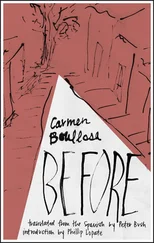On the boat, prodded by Apollodorus, I went around destroying, ripping apart the designs of the gods. I don’t know why this did not release gale-force winds or tidal waves. I turned my back on the gods; they turned theirs on me. I need to understand the consequences of my actions, but just as the Sirens’ song blinded the male slaves, the complicity of Apollodorus, who had acted as my friend for all those years — don’t fault my absence of sentimentality here — blinded me to understanding. Now I could never be Isis, now I would not be the one to unite two continents with a garland of flowers. I would not defend the territories of the gods. The gods who one day revealed their power in every flower, every ravine, every wave, are soon to fall silent. The trees of Elysium will lose their leaves. Their branches will display no harmony; they will form a chaotic tangle. Nature will lose its power to act, forfeit what the earth produces, the living soul of things, the breath of the World. Mankind will yearn to replace this truncated soul but will not be able to observe its own drives with joy and satisfaction. Dionysus will have to gather his belongings from the royal hall and drag them to the squalid passages of a hideout.
The gods knew that I would pay the price alone. I would lead Caesar to his death. They warned him of it, when they forced him to swim in the waters off Alexandria to save his life, in the rebellion of Ptolemy against my throne. Once he was dead, I would lead Antony, as he would lead me, into the jaws of defeat. I would destroy my design, I would end my life without having lived it. I would bring death upon Egypt. And the gods, I would drive them with me toward oblivion and deceit, to remain outside daily life, to be lost as inconsequential oddities on the verge of being forgotten.
I will achieve my final destruction by dismounting abruptly from my self, by yielding to the quadruple rhythm of that gallop that makes the heart of love resonate, two lives in one, Mark Antony and Cleopatra interlocking their destinies. I, too, hearkened to the song of the Sirens. The Amazons, natural enemies of love, did not come to protect me. My destiny was far worse than those of Acusilaus, Penthesilea, Thalestris, and Orthea. Antony dragged me toward defeat, and now the little man who claims to be my conqueror will gobble me up and murder my Apollodorus, Charmian, my faithful maidservants, and my three children born of Roman fathers, Caesarion, the legitimate heir of Julius Caesar and my twins by Antony.
I say all this, bathed in the blood of my Antony. I speak out in a loud voice to a world that in a few hours will perish with me. The Romans will not pardon me, but their chains are not for me. I will not grace their triumph; I will stain it by my absence. I hitched my star, the dream I received from heaven, first to that of Caesar and then to Antony’s, Romans both. I planned to have them as allies, though their people were my enemies and would one day bring to an end the kingdom of the gods on earth, destroying me and mine. Without the governing gods, we are are nothing.
The Romans hated my accomplices, a hate in part undeserved, for they always remained loyal to Rome and if they accepted my company, it was because they were convinced it would lead to the extension of the Empire. Let it be stated clearly: neither Caesar nor Mark Antony were unfaithful to Rome. Neither of them was an imbecile; the dream of uniting two continents would have been the guarantee of an eternity of sense, but a different future awaits them now, with Asia and Lybia abandoned, isolated on their peninsula and in the petty territory of Europe, convinced of being the center of the world. But the world is much more than you, Rome! It had another luster, it dreamed better dreams, it beat to the rhythm of the souls of various gods who were something more than statues and paintings! You assassinated Julius Caesar, for he dreamed of something bigger than your pettiness. You killed Mark Antony for the same reason, and with those two deaths you were committing long-term suicide. Your future was with me, but you chose to hate me, idiots!
From now on, men and women will be different from those I knew. Romans will dominate, reason will be in control, a cruel sort of reason, stained in men’s blood. A blood different from Mark Antony’s. Though he took me down roads that were not mine, he knew the tone of voice in which men used to speak to the gods and he saw their faces.
Diomedes the Informer
Those were the last words of Cleopatra and they are close to being mine as well. Diomedes can now pass through the gates of death with a clear conscience. Traitor and informer once, now I have truly been your voice, my queen. That was how you spoke before you were murdered by the Roman vipers who had so much fear of you. That poison did not come from a basket loaded with figs but from an order trembling with fear, a coward’s order, for it hid the hand that cast the stone.
Now I will join you in peace. I trust that there, in the place where you await me, the gods still deign to speak with men. For here on earth, as you foresaw, they maintain a mournful silence.
I wrote this book hand in glove with ancient authors. Some were Cleopatra’s contemporaries, most of them her enemies, like Virgil, Propertius and Cicero, all of whom despised her. I chose others, ranging from Sophocles to Anyte or Theocritus, convinced Cleopatra could have loved them.
I paid homage to these poets, whom I worship, by frequently turning their verses into adventures. One can recognize fragments of one or another poet in my narrative: Horace in the account of Cleopatra’s epic journey from Rome to the coast, an ancient Greek epigram in the section about Cleopatra and the graffiti artists, etc.
Memory and betrayal: I make more mischievous use of some classical texts, inverting their intentions, as when I redeployed a passage from Menander in writing about the Amazons. In Marguerite Yourcenar’s translation, Menander says:
Reste fidèle, femme, à ta position
De femme, à l’interieur de la maison. L’infâme
Seule hasarde le pied au dehors. C’est au chien
Qu’est la rue, et jamais à la femme de bien .
Both Cleopatra and the Amazons — and that’s one of the reasons I paired them in this book — choose to live a life “unfaithful” to their “nature.” Both, like “infamous persons,” live “a dog’s life,” to put it in Menander’s terms.
In another case, I borrowed one of Apuleius’s narrations in The Golden Ass , which he had lifted from a popular Greek tale, and restored it to the mouth of a Greek narrator, one of Cleopatra’s gladiator friends.
May these authors pardon my homages, and the readers enjoy them.
— C.B.












